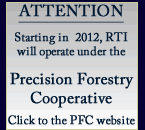|
Washington Forest Futures: Land Conversion and Cascade Foothills Forestry Viability Study PDF
As forest lands convert to higher market value non-forestry uses,
owners of the state’s private working forests find it increasingly
difficult to justify maintaining ownership of their productive
forest lands. Converting forest lands to urban uses diminishes
their environmental services and constrains the economic, social,
and ecological functions of adjoining private and public forest
lands. In this study we address the legislative intent of “assessing
the trends and dynamics that commercial and residential development
play in the conversion of the state’s forests to non-forestry
uses, analyzing the relationship between development and the conversion
of forest land uses, and developing alternatives for landowners
and communities in developing and implementing innovative approaches
to retaining traditional forestry while at the same time accommodating
new uses that strengthen the economic and natural benefits from
forest lands.”
Methodology
We will identify land uses across the state and analyze where
areas of existing and likely forest land use (working and non-working)
have changed to non-forest land uses, and identify factors that
appear to influence forest land conversion. We will also identify
a range of policy and market incentives to assist forest landowners
in keeping Washington’s forested landscapes intact. There
is no single data source or analysis that cohesively describes
the status of the forest land base across the entire state. This
study provides a rare opportunity to collaborate and build a conceptual
model to analyze and display both the current status of forest
lands statewide, and factors related to land use change.
The Cascade Agenda Forestry Work Group, led by the Cascade Land
Conservancy, will provide major support in preparing recommendations
related to Western Washington Cascade foothill forests. The Working
Group will be supported by UW College of Forest Resources analyses,
and will focus on the Cascade Foothills region in King, Pierce,
and Snohomish counties, with recommendations for alternative approaches
in Whatcom, Skagit, Thurston, and Lewis counties. The Working Group’s
objective is to develop consensus and recommendations on policies
and programs to assist large and small landowners and communities
in developing and implementing innovative approaches to retaining
traditional forestry and accommodating new uses that strengthen
both economic and natural benefits of forest lands.
Anticipated Outputs:
- Identification of areas of high, medium, and low levels of forest
land use change in both spatial and tabular form at a statewide
level.
- Description of forest land use conversion patterns by ownership
types at a statewide level and detailed parcel-level information
for specific sample areas in the state.
- Identification of factors associated with forest land use conversion
and how to assess those factors at both a regional and local
level.
- Assessment of the effectiveness of innovative approaches for
valuing non-market services provided by Washington’s public and
private forests.
- Identification of incentives and disincentives that facilitate
or impede the maintenance of working forests in areas susceptible
to land conversion, and programs that could minimize conversion
of forest lands to non-forest uses.
For answers to questions, contact Gordon
Bradley & Luke Rogers
|








